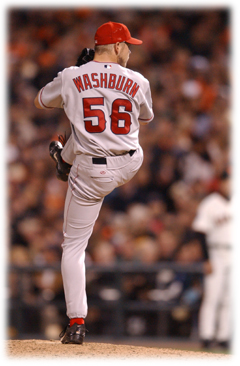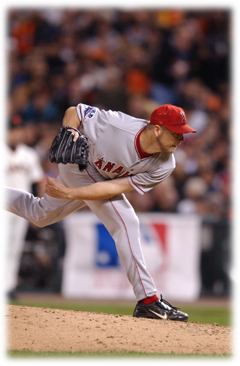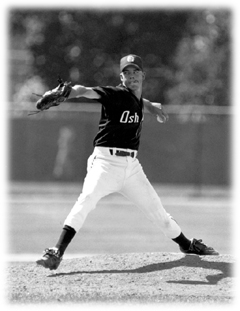UW-Oshkosh Baseball • The Jarrod Washburn Story
The impressive thing about Jarrod Washburn isn't so much what he's accomplished. And if you consider that in 2002 he established himself as one of the dominant left-handed pitchers in professional baseball while helping the Anaheim Angels win their first World Series, well, that's fairly remarkable.
 Even so, the impressive thing about the former UW-Oshkosh Titan is that he had the vision to dream it all in the first place.
Even so, the impressive thing about the former UW-Oshkosh Titan is that he had the vision to dream it all in the first place.
"When I was old enough to know what a baseball was I told my parents I wanted to be a ball player," says Washburn, who in 1994 pitched UW-Oshkosh to the NCAA Division III World Series title. "All I ever talked about growing up was how I wanted to be a professional baseball player."
A rather lofty goal considering that Washburn grew up in Webster, Wis., a town of 623 people snuggled among 100 lakes in the northwestern part of the state. Chances are by the time you're out of high school you've thrown more snowballs than fastballs in Webster. In a sport dominated by athletes from warm climates, you can count the number of professional baseball players coming out of northern Wisconsin on one mitten.
Still, Washburn was just bullheaded enough to figure he could make it.
"It didn't matter if I was playing catch with my brother (Ryan) or with my dad (Mike) or simply throwing a ball against the house by myself, I knew someday I would be a big leaguer," Washburn says. "The older I got the stronger that dream became."
And last season, while standing on the mound of Edison Field in Anaheim ready to throw the opening pitch of the World Series against the San Francisco Giants, Washburn new his dream had finally become reality.
"I don't know if you can put it into words," Washburn says of that moment last October. "It really was a dream come true. Everybody has one thing in life that they want to do more than anything else. Just imagine getting to do it. It's an amazing feeling of accomplishment."
It's also a moment, Washburn says, that wouldn't have happened if not for the help of long time Titan coach Tom Lechnir and the tradition of excellence of the UW-Oshkosh baseball program.
"I really don't think I would be in this position I'm in right now if I hadn't gone to UW-Oshkosh," Washburn says. "I've had the privilege of working with a lot of good coaches throughout my professional career and coach Lechnir ranks right up there with the best of them. I'm sure he loves what he does and wouldn't want to do anything else. But I would be the first to tell you that he's capable of being a big league pitching coach, he knows that much about it."
Selected by Anaheim in the second round of the 1995 Major League Baseball Amateur Draft, Washburn has played the past five major league seasons for the Angels. During that time, he's crafted a 46-26 record and a 3.81 earned run average in 619.1 innings. His 107 regular season pitching appearances include 97 starts and 401 strikeouts.
However, it wasn't until this past season that people in the baseball world really started taking notice. Quiet and unassuming off the field, Washburn grabbed national attention by going 18-6 with a 3.15 earned run average. During one memorable stretch of the season from April 19 to July 21 Washburn was unbeatable, winning a club-record 12 straight games. That streak was the longest in the American League and tied Houston's Wade Miller for the longest in the Majors last season.
When all was said and done, Washburn finished fourth in the Cy Young race honoring the American League's best pitcher after posting career bests in victories, starts (32), earned run average, innings pitched (206) and strikeouts (139).
Washburn was the Angel's first 18-game winner since Jim Abbot, Chuck Finley and Mark Langston in 1991. Perhaps the most telling statistic of his breakout season is that day-in and day-out Washburn gave his team a chance to win - the Angels were 22-10 in the games he started, while setting a club record by winning 13 games on the road.
 "Jarrod has clearly emerged as one of the top pitchers in the American League," Anaheim General Manager Bill Stoneman says. "He is a fierce competitor and we expect him to continue to perform at the level displayed last season." That competitive nature doesn't come as a surprise to people who know him and who have played with him.
"Jarrod has clearly emerged as one of the top pitchers in the American League," Anaheim General Manager Bill Stoneman says. "He is a fierce competitor and we expect him to continue to perform at the level displayed last season." That competitive nature doesn't come as a surprise to people who know him and who have played with him.
"Jarrod wanted to beat you whether it was baseball or ice fishing or hunting," says former teammate and current Oshkosh North High School Athletics Director Craig Lieder. "He hasn't changed a bit. He's shy and soft-spoken, but between the lines he was a different animal."
Washburn has never been one to consider the odds. Give him the ball and he figures he's got a pretty good chance of beating you. That bulldog toughness impressed Lechnir the first time he saw Washburn play - basketball.
"I got a call from his high school coach, Rusty Helland, and he tells me he has a kid that he thinks can play for us," Lechnir recalls. "His coach is a UW-River Falls graduate and he tells me this kid belongs at UW-Oshkosh."
So Lechnir, who prides himself in knowing every ballplayer in the state, pulls out a map and, after finding Webster, drives the nearly 300 miles north in the middle of winter to see Washburn play basketball.
"What I saw was a competitor," Lechnir says of seeing his future ace for the first time. "He got every rebound, every loose ball. And he shot every time he got the ball. He didn't make many shots but he wanted to win more than any other kid on the floor. He competed. And that's what impressed me."
Although he doesn't say it, Lechnir had to see some of himself in Washburn. Like many of the kids who play for him, Lechnir is a product of a small Wisconsin town. At Mosinee High School in the mid-70s, Lechnir was as tough of a competitor as that paper mill town ever produced. Losing? Lechnir enjoyed it as much as the measles. That attitude is reflected in his team.
"You can teach kids a lot," Lechnir says. "You can show them how to throw and how to hit and how to field, but the desire to win, that's something you have to bring with you. That's what makes Jarrod special. He wants to win."
Washburn wasn't an instant hit at UW-Oshkosh. As a matter of fact, he was red-shirted his freshman year. Which, he now says, was the best thing that could have happened to him.
"When I got to college I could throw pretty hard, but I had no idea where the ball was going. I didn't have a clue. All I could do was rear back and throw hard. Other than that I had no idea of how to pitch. I didn't know how to throw different pitches and my mechanics were very, very inconsistent. Basically, they were terrible. I was, to say the least, a project."
Even so, when Washburn arrived at UW-Oshkosh he was certain he would tear it up.
"I went in pretty cocky," Washburn admits sheepishly. "I figured I'd walk right in and play. It kind of brought me down to earth seeing all these other guys who were either just as good or who at the time were better than me. I struggled so much that I even thought about not coming back.
"It was a little wake-up call for me. I knew I better work a little harder and try to figure some things out if I was going to play for this team. It was pretty clear that I wasn't good enough to play. It was something that I wasn't used to but it was, in hindsight, good for me. Instead of stepping in and having things easy I had to work extra hard and experience some adversity for the first time."
That first year, as Washburn watched, the Titans finished 28-15 and placed second at the NCAA Division III World Series.
"I remember guys coming back from the World Series and being mad. It was good to see," Washburn says. "The team went to the World Series, had a great year but the guys weren't satisfied. And that's the kind of guys I wanted to be teammates with. That's when you realize that you're part of a very special program."
 Over the next two seasons for the Titans, Washburn dominated, going 15-2 with a 1.97 earned run average. He was a 1995 NCAA Division III All-America second team selection and struck out 141 batters during his UW-Oshkosh career, including 17 in a 1-0 win over UW-Whitewater in 1995. In 1994, Lechnir gave the ball to his freshman lefthander in the biggest game of the season - the championship game of the NCAA Division III World Series. Washburn responded by scattered nine hits and striking out eight batters in nine innings as the Titans defeated Wesleyan University (Conn.).
Over the next two seasons for the Titans, Washburn dominated, going 15-2 with a 1.97 earned run average. He was a 1995 NCAA Division III All-America second team selection and struck out 141 batters during his UW-Oshkosh career, including 17 in a 1-0 win over UW-Whitewater in 1995. In 1994, Lechnir gave the ball to his freshman lefthander in the biggest game of the season - the championship game of the NCAA Division III World Series. Washburn responded by scattered nine hits and striking out eight batters in nine innings as the Titans defeated Wesleyan University (Conn.).
That World Series triumphant, Washburn claims, was just as memorable as the one he and his Angel teammates won last season.
"At the time, when I was in college, I wasn't thinking about winning a Major League World Series at all. The ultimate goal when I was in college was to win the College World Series. We worked hard all year long to achieve one goal. At that time there was no greater feeling in the world. You get to the big leagues it's the same thing: you want to win the World Series. We were able to do that. It's pretty much exactly the same feeling just on a bigger stage."
Much has changed for Washburn. The kid who once hit rocks into a nearby lake while dreaming about playing professional baseball now has a World Series ring, national notoriety and a $3.875 million one-year contract he signed with the Angels in the off-season.
Still, for all that has changed, much remains the same. Washburn still lives in Webster during the off-season with his wife, Kerrie, and their two-year-old son, Jack. He still loves to hunt and fish. And he's still more comfortable in flannel than he is in anything with an Armani label. Washburn may be in the Big Leagues but he's not Big Leaguing anyone. Above all, he remains a Titan at heart.
"Once a Titan, always a Titan," Washburn says. "No question. I try to stay as close to the program as possible. I check their scores on the Internet and, of course, I talk a lot with coach."
 That will never change, Washburn says. The bond that formed between player and coach grows stronger with each passing year.
That will never change, Washburn says. The bond that formed between player and coach grows stronger with each passing year.
"When I first came to UW-Oshkosh coach rode me pretty hard because he wanted to make sure that I got the most out of my abilities," Washburn says. "He talked with me a lot and worked with me a lot and yelled at me a lot. He did whatever he could to make me better. When I got drafted I realized how much coach did for me to make me the pitcher that I was. I knew that I wouldn't be where I was without him.
"When I was in the minors we always stayed in contact, talking as much as possible. It was a tough time. The travel, being away from home, anyone who has ever gone through it will tell you the same thing - it's hard.
"The one thing coach told me when I got drafted was that if I ever needed him for anything that he would be there for me. He said I don't care if it's 3 in the morning, call. If you need me to be there I'll fly out the next day. That meant a lot to me. Just by talking more and more as the years went on we became friends. Now I consider him to be one of my best friends."
And so the kid with the Big League dreams, the one with the World Series title forever attached to his name, the player with the multi-million dollar contract, that kid, he remains pretty much the same. Maybe that's the most impressive thing about Jarrod Washburn after all.
Written By Paul Kennedy (February 1, 2003)